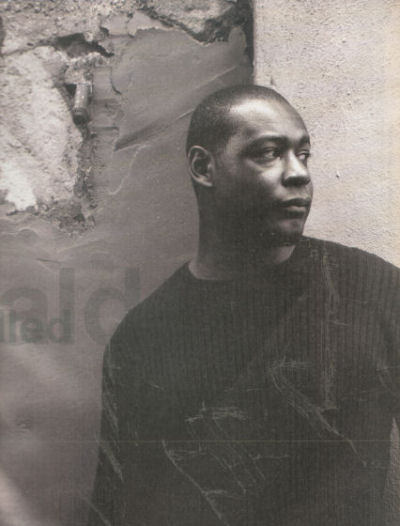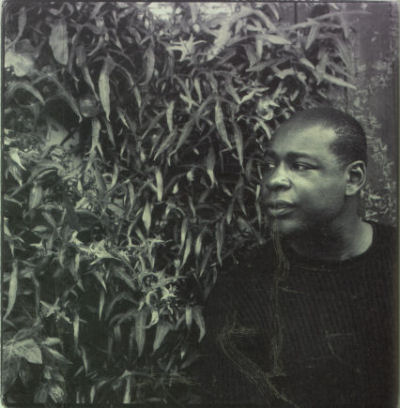| A Guy Called Gerald | |
 |
DJ Magazine |
 Never in the field of electronic music was so much owed by so many to one man, who hardly saw a penny of it and wound up furious enough to practically invent jungle. Like an everyman in the history of acid house, the story of a guy called Gerald Simpson is one of cheats, choons and charts positions, of unscrupulous Indies and monolithic majors. Its a story of ground broken and money stolen, of records like 'Voodoo Ray', 'Pacific State' and 'Black Secret Technology'. It's a fable of triumph over adversity, good over evil, and Like all good cliches, this one has a happy ending. June 2000, 4am, Barcelona: on the terrace overlooking the beach at the multimedia Sonar festival, A Guy Called Gerald is road-testing some tracks from his new album, 'Essence', sung by his new singer Heather Martin. She looks like a more serene Kelis with her curly mop of bleached hair as she takes an intensely focused audience through the pristine drum & bass-backed and smooth r&b vocal cuts. Then something bizarre happens. Right in the middle of one of the slowest, sweetest songs, the till-now composed crowd ruptures into spontaneous applause and cheering. The song is so bloody good we can't wait till the end to show our esteem. Last year, travel book publishers The Rough Guide compiled a couple of pocket reference books, one called House and one Drum & Bass. A Guy Called Gerald is the only artist with an entry in both. As arguably the most creative member in the early years of 808 State - he wrote most of the acid house classic 'Newbuild' album and originally sequenced 'Pacific State' - and as a solo artist behind the awesome 'Voodoo Ray', he laid the groundwork for a decade of British house music. Likewise, for the pioneering output of his hardcore Label Juice Box, including two landmark albums - 1992's ultra-rare jungle blueprint '28 Gun Bad Boy' and 95's mature drum & bass document 'Black Secret Technology' - he'll be remembered as a true breakbeat hardcore trailblazer. The Sonar episode gives you some idea of the reaction awaiting his new album, an exquisite collection of rootsy downtempo and refined vocal drum 8 bass with a bunch of vocalists including Lady Miss Kier, Lamb's Louise Rhodes and singer songwriter Wendy Page. Begs the question of course, where's he been for so Long? "I've been on a mission, working on putting my music out," he says back in the UK, ensconced on a black leather sofa in the west London mews offices of his new UK label Studio!K7. "I had to disband Juice Box and move my studio out to New York. For the past two years I've been doing my album. And reading a lot, trying to know more about what it's all about, the bigger picture." Gerald is getting the bigger picture from his house in Brooklyn - "You get to see the real New York there. Manhattan tends to be real touristy" - and relishing the freedom a new city gives. "There's no kind of rules to the style of music you can make. They've got more of a jazz mentality, more freeform. Dance music's such small thing there; the biggest things over there are rock and rap. So everything else is really small." That affinity for the underground has ruled Gerald's movements from the word go. Gerald Simpson began DJing in 1985, playing hip hop and electro in youth clubs around Moss Side, Rusholme and Longsight, some of the less salubrious areas of his home town of Manchester. The young Gerald was also a natural born tinker. "It was a real curiosity when I was a kid, I'd take everything apart, pulling apart speaker boxes and trying to rebuild them. I think from there it was just an attraction - synth music of any type really interested me. Could've been anything, Jean Michelle Jarre, Kraftwerk." In 1987 he made his way into a studio in Hulme with his mate MC Tunes, Gerald made his first tune, 'Back To Attack', which he took into the city's vinyl mecca Eastern Bloc where future members of 808 State worked. They liked the track and included it on an EP they released under the guise of The Hit Squad. Next up, a record he made on his very rudimentary set-up of a sampler, 303 and drum machine was about to change the face of UK house. 'Voodoo Ray', with its exotic vocal wail and infectious stabbing melody, was a textbook in deceptively minimal, Detroit-inspired production. Mike Pickering caned it at the Hacienda as did all sorts across the country until it climbed to an unprecedented No12 in the national charts. He didn't see a penny the sales money and this was the start of a series of exploitative treatment. The head of Liverpool's Rham Records kept coming up with excuses. "Well the story from the record label," recalls Gerald, " was firstly it's not selling, then when it was in the charts, the distributor's gene bankrupt. At the same time he's bought this sweet shop and a new car. Then he basically disappeared for a couple of years. "We managed to find him in the end and at least got my publishing back and got some royalties. I would say if he's out there, he's probably doing that to some other poor sod. That's if he's still alive, because not everybody's as good natured as me." Is it true you were still working in McDonalds while 'Voodoo Ray' was in the charts. "Yeah, I wasn't getting paid for it at the time, and I couldn't sign on because my record's in the fucking charts. It was causing disturbances in there, people coming in and harassing me so I soon had to leave." 'Hot Lemonade' soon also came out through Rham, though it was a rush job says Gerald because the label wanted 'Voodoo Ray' fresh in people's minds. "It was pretty experimental at the time but it needed a bit more time," he says. Meanwhile, all the work he'd done with the 808 State boys, all done on his equipment, Gerald says was done in good faith. "Not getting credit on the records was the last straw. Leading up to that was basically working on something and not getting any feedback from it, or payment. All the early 808 State stuff, the Hit Squad, Lounge Jays and Massagarama single, I'd been working on a promise, nothing was ever signed. Even before it got to 'Pacific State', I'd already decided that I wasn't going to do any more work with them. They said if I did a Peel Session with them then I would get paid for that. So I did three tracks for that, of which one was 'Pacific State'. And I didn't see anything from that till a long time after.” What were they telling you? "It wasn't selling, they were waiting to hear stuff from distributors - you know, when you run a record shop, you've got a million and one excuses. I'd walk into the shop and I could see the look of dread in Martin [Price]'s eyes and he just knew that I was going to ask for some money. It's one of them where you learn to cut your losses and push on." On the strength of 'Voodoo Ray', a record charting on zero marketing budget, Sony signed Gerald up, but it was a case of frying pan and fire. The darkly uncompromising single and album called 'Automanikk' failed to sell in anything like the same quantities. "By then I'd been through all the whole business with 808 and Rham, and I wasn't going to take any more shit. They wanted an LP of 'Voodoo Ray's; they wanted happy and I wasn't very happy at the time. I was kind of on my journey to move onto doing other things, to experiment." During his time with Sony, Gerald was about as far from the mainstream as you can get - barely, legal in fact, running his Juice Box sound system with MC Tunes, spinning post-Hacienda after-parties in Moss Side. "They were always real blues shabin type places - playing all that early breakbeat stuff like the 'Green Man', Nicolette, 'Papua New Guinea'. Every time we did a party there'd be police helicopters hovering above and lines of vans down the road and clubs didn't like that kind of attention so they wouldn't have any of it." Gerald's second LP for Sony, 'High Life, Low Profile' was shelved. The masters are still boxed up at the label. "It was even more Detroity sounding - a bit too hardcore for them. So that was another cut-and-leave."  His career now a shambles, there was nothing for Gerald to do but go it alone, launching hi- own label with the Juice Box name and began ripping up breakbeats and gun-play samples in apparently musical payback on the mainstream of UK dance music. A series of early jungle cuts and his first breakbeat album '28 Gun Bad Boy' were heavy with with rude boy posturing and criminal-minded rage in this 1992, way ahead of time. Pioneering done, Gerald dug deeper into a more intricately futuristic breakbeat 'science on cuts Like 'Finley's Rainbow', ‘Najinzi Zaka', 'Energy' (produced with Goldie) and, still one of the finest drum & bass artist albums, 'Black Secret Technology'. When things got busy, he brought in a partner to run the label but still things didn't go to plan, the two eventually falling out. Always conceived as a vigorously independent imprint, Gerald's partner complicated things with "too many major label ideas" including selling to one when he tried to broker a deal with Island. Gerald took the music while his partner took the name. "I don't think he's done anything with it. I think he works in a shoe shop now actually”, laughing. One thing: if you hadn't been screwed so often with your early stuff, would you have been so drawn to the tough jungle sound? "No, I think I would have gone down more of a soul route. I was always into electronic stuff, but I was also into the production clarity you get on a good soul record, so I'm sure I would've gone down that route." Which brings us back to the Sonar gig, a truly special Live music moment. Gerald looks set to have the last laugh: a very cool new album, a five-piece band to tour with, a dream collaboration with Herbie Hancock and Bill Laswell and a new DJ residency in New York are all his. And boy, has he earned it. [Author: DJ Magazine] |
|